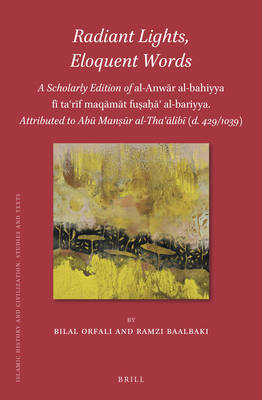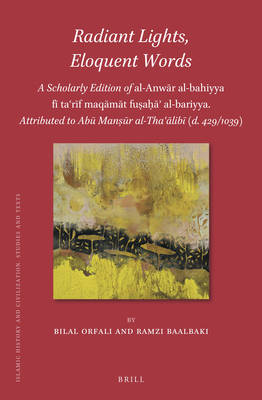
- Afhalen na 1 uur in een winkel met voorraad
- Gratis thuislevering in België vanaf € 30
- Ruim aanbod met 7 miljoen producten
- Afhalen na 1 uur in een winkel met voorraad
- Gratis thuislevering in België vanaf € 30
- Ruim aanbod met 7 miljoen producten
Zoeken
Radiant Lights, Eloquent Words: A Scholarly Edition of Al-Anwār Al-Bahiyya Fī Taʿrīf Maqāmāt Fuṣaḥāʾ Al-Bariyya. Attributed to Abū Manṣūr Al-Thaʿālibī (D. 429/1039)
Bilal Orfali, Ramzi Baalbaki
€ 242,95
+ 485 punten
Omschrijving
K. al-Anwār al-bahiyya fī taʿrīf maqāmāt fuṣaḥāʾ al-bariyya is a work of adab attributed to the renowned littérateur and historian of literature Abū Manṣūr al-Thaʿālibī. The work consists of an introduction and four chapters. The first three chapters are concerned with knowledge (ʿilm): Chapter One discusses the merit and application of knowledge, Chapter Two the definition of knowledge and its true meaning, and Chapter Three the conditions of knowledge. The fourth chapter, which constitutes the bulk of the book, is concerned with occasions on which scholars and sages made speeches in the presence of rulers. It is divided into two parts: Part One presents pre-Islamic (jāhiliyya) speeches, incorporating Arab, Greek, Byzantine, Persian, and Indian traditions, and Part Two presents Islamic speeches. The work is introduced by an analytical study discussing the attribution of the work, its relation to the Maqāmāt genre, and the manuscripts used.
Specificaties
Betrokkenen
- Auteur(s):
- Uitgeverij:
Inhoud
- Aantal bladzijden:
- 204
- Taal:
- Engels
- Reeks:
- Reeksnummer:
- nr. 192
Eigenschappen
- Productcode (EAN):
- 9789004516694
- Verschijningsdatum:
- 19/05/2022
- Uitvoering:
- Hardcover
- Formaat:
- Genaaid
- Afmetingen:
- 160 mm x 236 mm
- Gewicht:
- 430 g

Alleen bij Standaard Boekhandel
+ 485 punten op je klantenkaart van Standaard Boekhandel
Beoordelingen
We publiceren alleen reviews die voldoen aan de voorwaarden voor reviews. Bekijk onze voorwaarden voor reviews.











